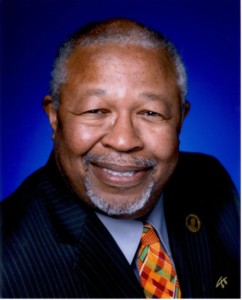Willis, Texas native
The Black Businessman Who Built an Empire Despite Jim Crow Oppression
Using white colleagues as front men, Bernard Garrett bought real estate, made millions and uplifted fellow blacks in pursuit of the American dream.
(History.com) During the 1950s and ‘60s, the civil rights movement dominated the political landscape. But for Bernard Garrett, an African American born and raised in the South, the surest path to improving conditions for black Americans was by achieving economic freedom.
Garrett, unbeknownst to many, purchased at least 177 buildings, including what was considered to be the tallest structure in downtown Los Angeles in 1961, the Banker’s Building, all the while creating life-changing opportunities for African Americans.
“The only time a man is really truly rich is when he controls money,” Garrett said years later in an interview about his life.
Born in the small town of Willis, Texas, in 1922, Garrett showed a knack for business early on. (more)
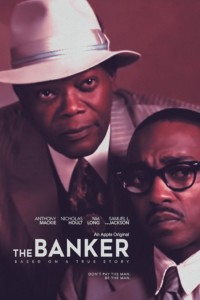 Related: Revolutionary businessmen Bernard Garrett (Anthony Mackie) and Joe Morris (Samuel L. Jackson) devise an audacious and risky plan to take on the racist establishment of the 1960s by helping other African Americans pursue the American dream. Along with Garrett’s wife Eunice (Nia Long), they train a working class white man, Matt Steiner (Nicholas Hoult), to pose as the rich and privileged face of their burgeoning real estate and banking empire – while Garrett and Morris pose as a janitor and a chauffeur. Their success ultimately draws the attention of the federal government, which threatens everything the four have built. To watch trailer, click here.
Related: Revolutionary businessmen Bernard Garrett (Anthony Mackie) and Joe Morris (Samuel L. Jackson) devise an audacious and risky plan to take on the racist establishment of the 1960s by helping other African Americans pursue the American dream. Along with Garrett’s wife Eunice (Nia Long), they train a working class white man, Matt Steiner (Nicholas Hoult), to pose as the rich and privileged face of their burgeoning real estate and banking empire – while Garrett and Morris pose as a janitor and a chauffeur. Their success ultimately draws the attention of the federal government, which threatens everything the four have built. To watch trailer, click here.
Historically Black Colleges And Universities’ Contributions To The NFL With Dr. Derrick E. White
(KUT.org) On this edition of In Black America, producer/host John L. Hanson Jr. speaks with Dr. Derrick E. White, associate professor of history and African American and Africana studies at the University of Kentucky and author of Blood, Sweat and Tears: Jake Gaither, Florida A&M, and the History of Black College Football.
White talks about black college football during Jim Crow segregation, how these programs transformed African American communities, college football at Florida A&M University, Coach Jake Gaither and how these programs faced challenges when majority institutions began recruiting African American athletes. (more)
From the archives to the front office: Historian settles into leadership role at African American Museum
After spending years bringing order to facility’s storage area, enthusiastic W. Marvin Dulaney has been tapped deputy director and chief operating officer.
(Dallasnews.com) It’s no April Fool’s joke when I tell you that old things are being made new at the African American Museum at Fair Park.
For more than two years, historian and retired university professor W. Marvin Dulaney privately volunteered in the museum’s unseen archive storage room, whose shelves overflow with dusty stacks of boxes. The archive holds myriad artifacts and records, including countless books, magazines, newspapers, private collections, videotapes and awards of prominent Dallas-area and national African-American organizations, businesses, individuals and families.
“I get excited when I talk about this,” said Dulaney, who knows a thing or two about the importance of preserving history. “It’s a challenge. But I love doing this. In fact, I’m in heaven.”
Museum president and founder Harry Robinson Jr. , a veteran librarian and archivist, and Vonciel Jones Hill, the museum’s new board president, as well as an attorney, minister and former Dallas City Council member, have been enjoying Dulaney’s enthusiasm.
Robinson and Hill have hired Dulaney as the museum’s new deputy director and chief operating officer. The job is a paid staff position in which he oversees the landmark museum. Before Dulaney began organizing the archives, he helped facilitate many of the museum’s student conferences, competitions and history summer camps. (more)
TIPHC Bookshelf
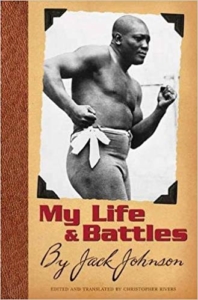 Published scholarship on black history in Texas is growing and we’d like to share with you some suggested readings, both current and past, from some of the preeminent history scholars in Texas and beyond. We invite you to take a look at our bookshelf page – including a featured selection – and check back as the list grows. A different selection will be featured each week. We welcome suggestions and reviews. This week, we offer, “My Life & Battles,” by Jack Johnson.
Published scholarship on black history in Texas is growing and we’d like to share with you some suggested readings, both current and past, from some of the preeminent history scholars in Texas and beyond. We invite you to take a look at our bookshelf page – including a featured selection – and check back as the list grows. A different selection will be featured each week. We welcome suggestions and reviews. This week, we offer, “My Life & Battles,” by Jack Johnson.
African American historian Gerald Early refers to Jack Johnson (1878-1946), the first African American heavyweight champion of the world, as the first African American pop culture icon. Johnson is a seminal and iconic figure in the history of race and sport in America. This manuscript is the translation of a memoir by Johnson that was published in French, has never before been translated, and is virtually unknown. Originally published as a series of articles in 1911 and then in revised form as a book in 1914, it covers Johnson’s colorful life and battles, both inside and outside the ring, up until and including his famous defeat of Jim Jeffries in Reno, on July 4, 1910.
In addition to the fights themselves, the memoir recounts, among many other things, Johnson’s brief and amusing career as a local politician in Galveston, Texas; his experience hunting kangaroos in Australia; and his epic bouts of seasickness. It includes portraits of some of the most famous boxers of the 1900-1915 era―such truly legendary figures as Joe Choynski, Jim Jeffries, Sam McVey, Bob Fitzsimons, Philadelphia Jack O’Brien, and Stanley Ketchel. Johnson comments explicitly on race and the color line in boxing and in American society at large in ways that he probably would not have in a publication destined for an American reading public. The text constitutes genuinely new, previously unavailable material and will be of great interest for the many readers intrigued by Jack Johnson. In addition to providing information about Johnson’s life, it is a fascinating exercise in self-mythologizing that provides substantial insights into how Johnson perceived himself and wished to be perceived by others. Johnson’s personal voice comes through clearly-brash, clever, theatrical, and invariably charming. The memoir makes it easy to see how and why Johnson served as an important role model for Muhammad Ali and why so many have compared the two.
This Week in Texas Black History
Mar. 29
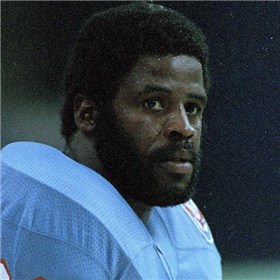
Running back Earl Campbell, the first Heisman Trophy winner for the University of Texas football program, was born this day in Tyler in 1955. He attended John Tyler High School then starred for the Longhorns, becoming the first player to earn All-Southwest Conference honors four years (1974-1977). As a senior in 1977, he led the nation in rushing with 1,744 yards and was awarded the Heisman. Campbell was the first overall pick of the 1978 National Football League draft by the Houston Oilers with who he was a 1978 Rookie of the Year, three-time league Most Valuable Player, and league-leading rusher three times. In 1990, he was inducted to the College Football Hall of Fame and the following year to the Pro Football Hall of Fame. In 1981, the Texas Legislature enshrined Campbell as an Official State Hero Of Texas, an honor that had been bestowed on only three others – Davy Crockett, Stephen F. Austin, and Sam Houston.
Mar. 30
On this date in 1870, President Ulysses S. Grant signed an act to readmit Texas to Congressional representation after Texas voters approved a revised state constitution, as required under the Radical Reconstruction, and elected a state government in November 1869. The new Legislature convened and ratified the 13th, 14th and 15th Amendments to the U.S. Constitution, the final requirements for readmission to the Union. The 13th Amendment outlawed slavery, the 14th granted citizenship to “all persons born or naturalized in the United States,” which included former slaves, and the 15th guaranteed black men, including freed slaves, the right to vote.
Mar. 31
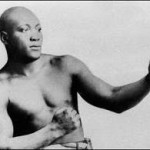
On this date in 1878, boxer John Arthur “Jack” Johnson was born in Galveston. Johnson would become the first African American to win the world heavyweight title in 1908 when he defeated Tommy Burns in Sydney, Australia via decision in a 14-round bout. In 113 fights, Johnson lost only eight and is considered one of boxing’s all-time greats. Former champion Jim Jeffries came out of retirement to challenge the black champion and was billed as “The Great White Hope” when they met on July 4, 1910, in Reno, Nevada. In what was called, “The Fight of the Century,” Johnson soundly beat Jeffries. In 1990, Johnson was inducted into the International Boxing Hall of Fame.
Apr. 2
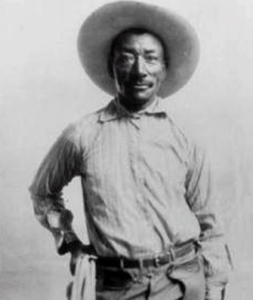
On this date in 1932, Bill Pickett, the cowboy who invented the technique of “bulldogging” steers, passed away after being kicked in the head by a horse. On his radio show, Pickett’s friend Will Rogers announced the funeral at the 101 Ranch, near Ponca City, Okla., commenting: “Bill Pickett never had an enemy, even the steers wouldn’t hurt old Bill.” Known as the “Dusky Demon,” Pickett was a native of Taylor, northeast of Austin. In 1971, he became the first black man elected to the National Cowboy Hall of Fame and Western Heritage Center in Oklahoma. In 1993, the U.S. Postal Service honored him as part of its Legends of the West series of stamps.
Apr. 3
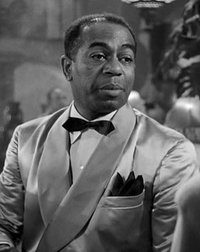
In 1886, musician Arthur “Dooley” Wilson was born on this day in Tyler. Wilson is most notably known for his role as “Sam,” the piano player in the Humphrey Bogart film, “Cassablanca,” and the target of the famous line, “Play it again, Sam,” in reference to the song, “As Time Goes By.” Ironically, Wilson was actually a drummer and couldn’t play piano. In the film, he mimicked the hand movements of an off-screen pianist. Wilson also appeared on Broadway, including the play, “Cabin in the Sky.”
Apr. 3
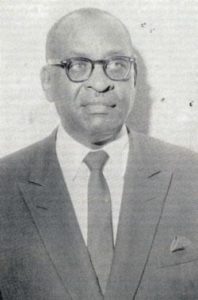
In 1944, on this day, the U.S. Supreme Court rules in Smith v. Allwright that Texas’ “White primaries” could not exclude black voters. Civil Rights activist Dr. Lonnie Smith, a dentist, had attempted to vote in the 1940 Democratic Primary but was denied a ballot at his Houston precinct because voting was open only to whites. With help from the NAACP, Smith filed a suit that reached the U.S. Supreme Court which ruled in his favor, opening primary voting to all eligible Texans. Smith was born in Yoakum, Texas, in 1901. He graduated from Providence Hill High School in Providence in 1919 and attended Prairie View A&M College for two years. Smith received a D.D.S. degree from Meharry Medical College in Nashville, Tennessee, in 1924.
Apr. 4
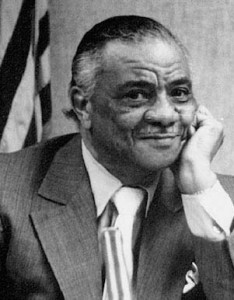
On this day in 1974, Oscar DuConge (pronounced “dew-con-jay”) was elected Waco’s first African American mayor. Born in Pass Christian, Miss., the ninth of 14 children, DuConge grew up in New Orleans and graduated from Xavier University in 1931 with a degree in sociology. He moved to Waco in September 1948 following World War II and serving in the Army. He rose to political prominence when he was elected to the Waco City Council in 1972. After leaving the council in 1975, he remained active in civic affairs and charity in Greater Waco, promoting racial harmony and fighting to eradicate poverty. DuConge died at age 69 on July 26, 1978. His wife, Kitty DuConge, continued to be active in the community until her decline in health and eventual death on Aug. 31, 1999.
Apr. 4
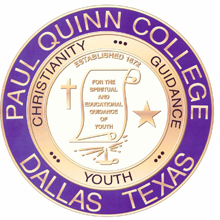
Paul Quinn College was founded by a small group of African Methodist Episcopal preachers in Austin on this day in 1872. The school was relocated to Waco in 1877 and then to Dallas in 1990. The school is the oldest liberal arts college for African Americans in Texas and was named after William Paul Quinn who was A.M.E. Bishop of the Western States.
Blog: Ron Goodwin, Ph.D., author, PVAMU history professor
Ron Goodwin is an assistant professor of history at Prairie View A&M University. Even though he was a military “brat,” he still considers San Antonio home. Like his father and brother, Ron joined the U.S. Air Force and while enlisted received his undergraduate degree from Texas Lutheran University in Seguin, Texas. After his honorable discharge, he completed graduate degrees from Texas Southern University. Goodwin’s book, Blacks in Houston, is a pictorial history of Houston’s black community. His most recent book, Remembering the Days of Sorrow, examines the institution of slavery in Texas from the perspective of the New Deal’s Slave Narratives.
Recent Posts
For every beginning there’s an end
To live is to die. Every beginning has an end. That’s not a very pleasant way to begin, but as Believers we are on a journey that ends with the grave. As a child I watched my mother deal with her mother as she entered the last chapters of her life. I didn’t fully understand what was going on, but I remember my mother assisting my grandmother to her various appointments. As life would…(more)
Lessons from Saturday Morning
One of my fondest memories from childhood is Saturday morning cartoons. That was the only time of the week I gladly woke up at 7 a.m. I remember rushing in my pajamas to that big(?) 19” TV to watch Bugs Bunny and Super Friends. Sometimes my mother would sit with me. But I remember not really wanting her watching cartoons with me. Its not that I didn’t enjoy my mother’s company, because I did. (more)
Submissions wanted
Historians, scholars, students, lend us your…writings. Help us produce the most comprehensive documentation ever undertaken for the African American experience in Texas. We encourage you to contribute items about people, places, events, issues, politics/legislation, sports, entertainment, religion, etc., as general entries or essays. Our documentation is wide-ranging and diverse, and you may research and write about the subject of your interest or, to start, please consult our list of suggested biographical entries and see submission guidelines. However, all topics must be approved by TIPHC editors before beginning your research/writing.
We welcome your questions or comments. Please contact Michael Hurd, Director of TIPHC, at mdhurd@pvamu.edu.


